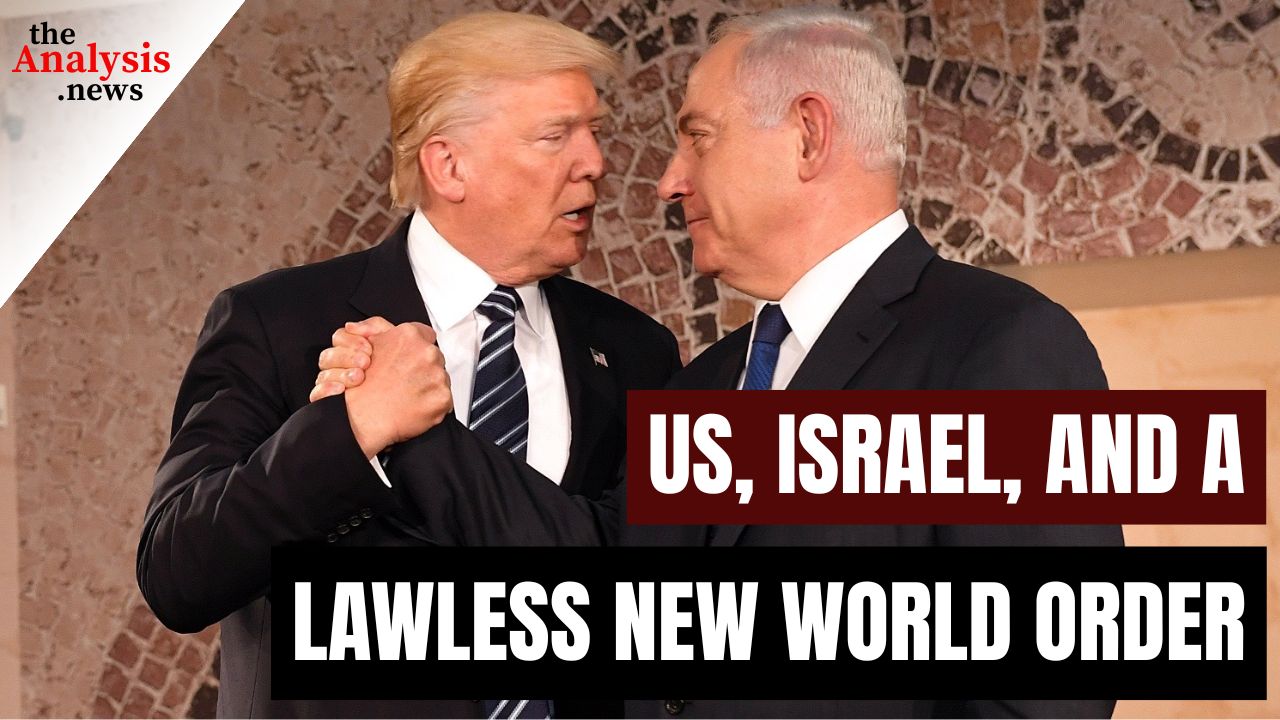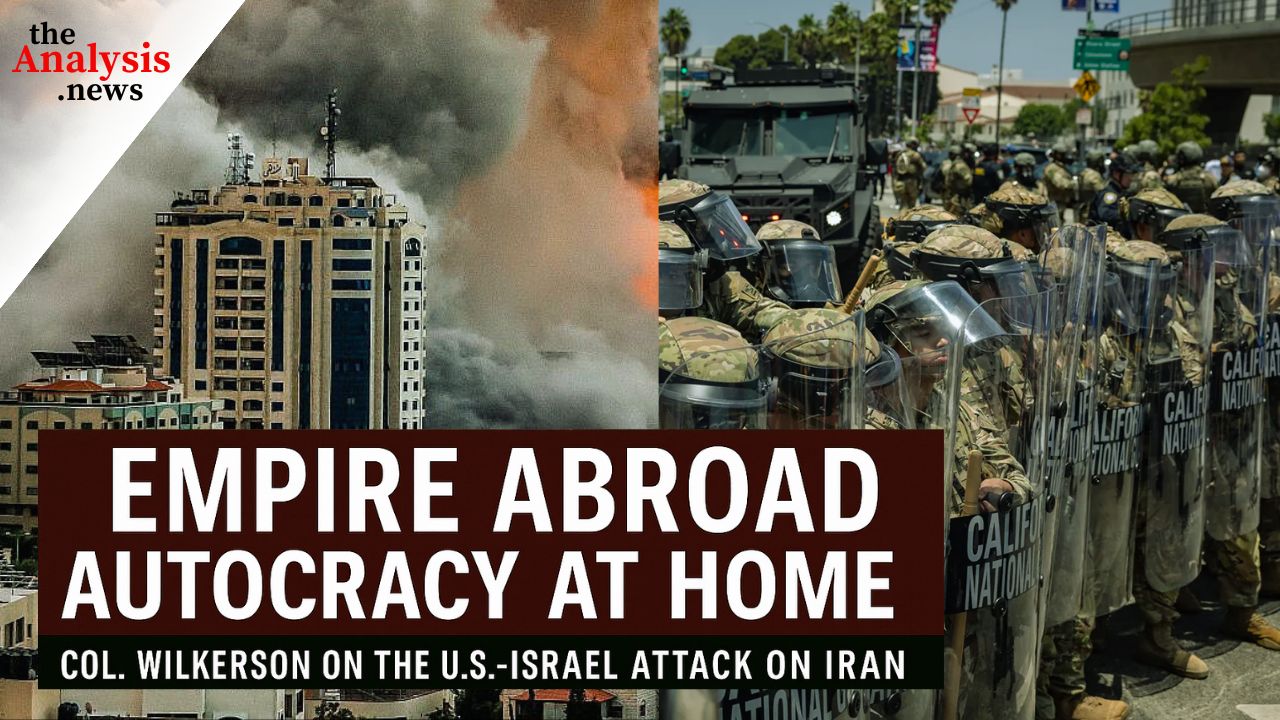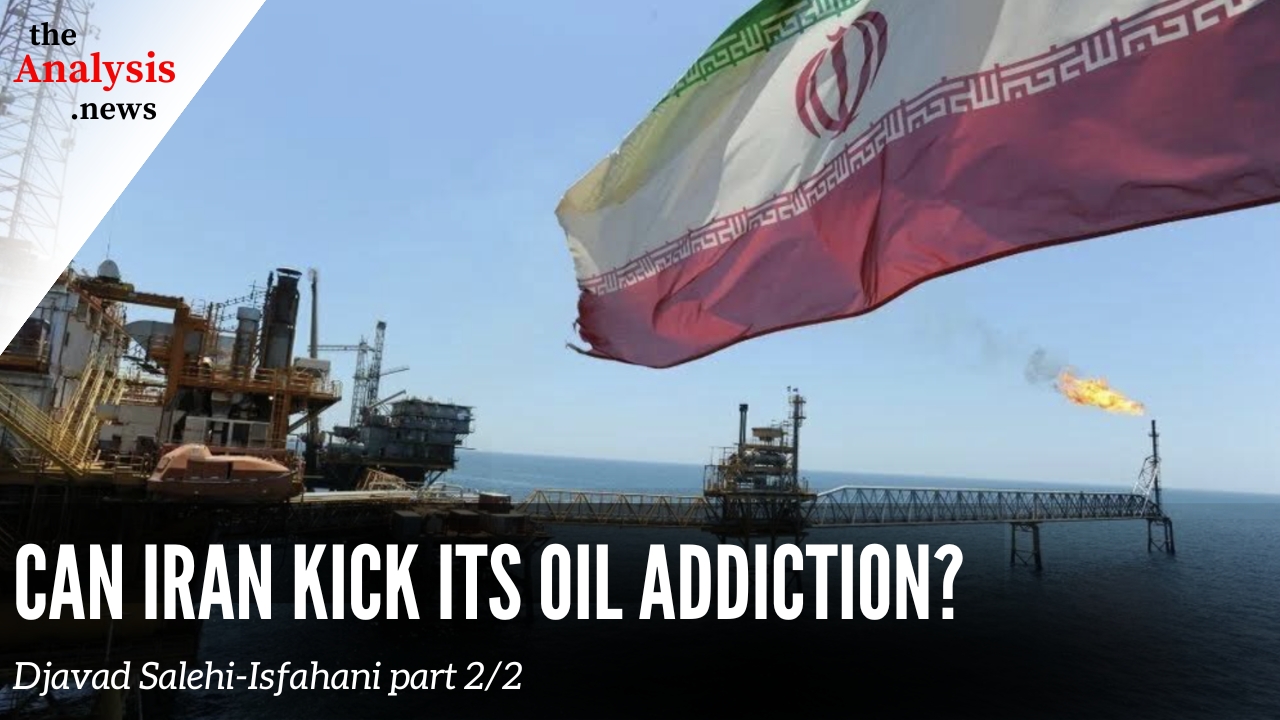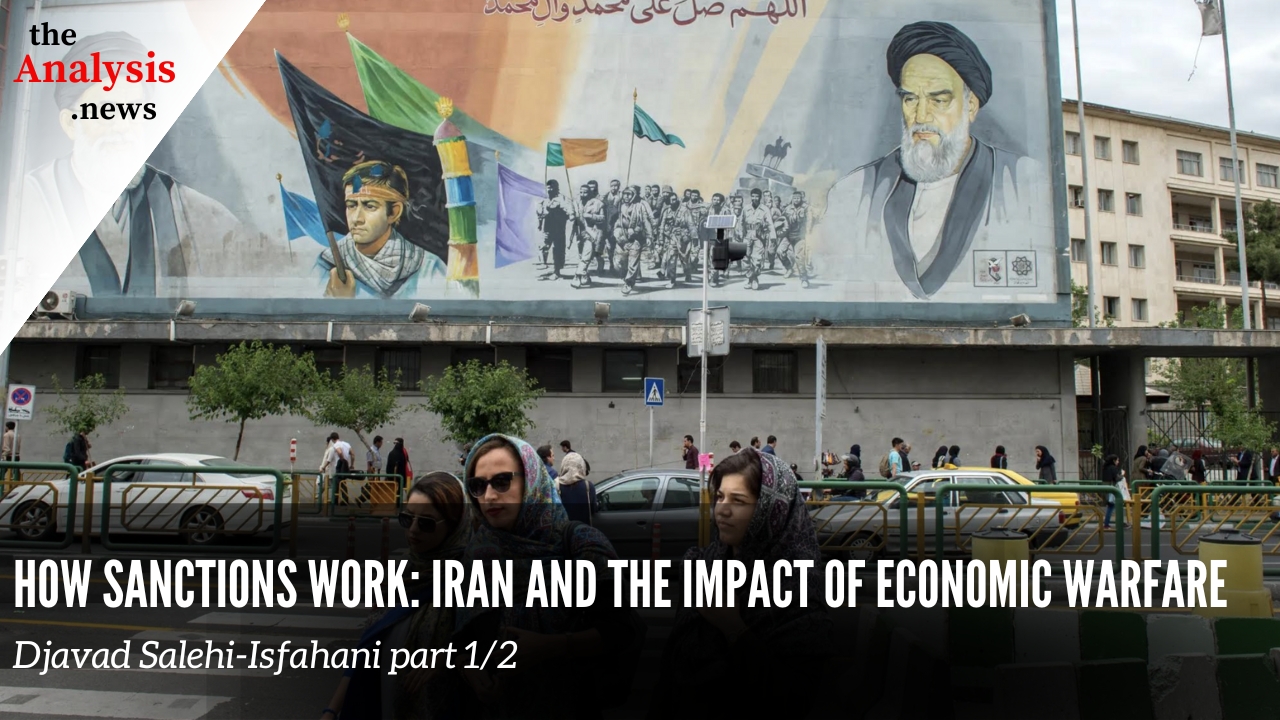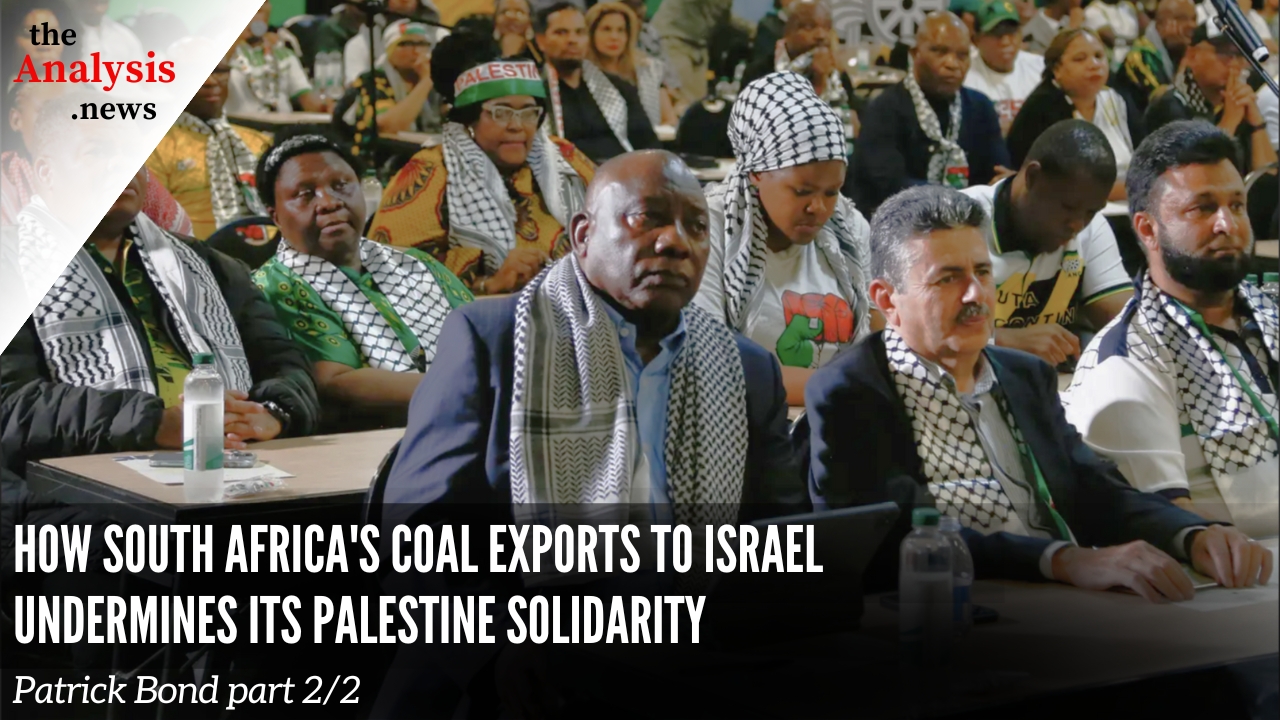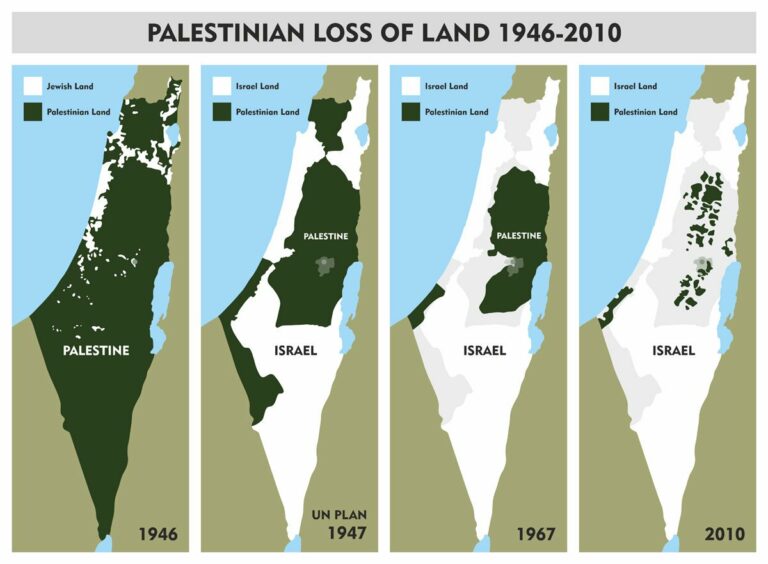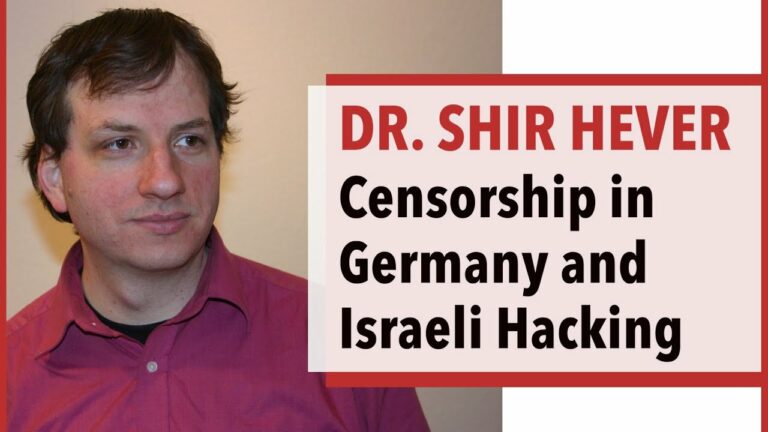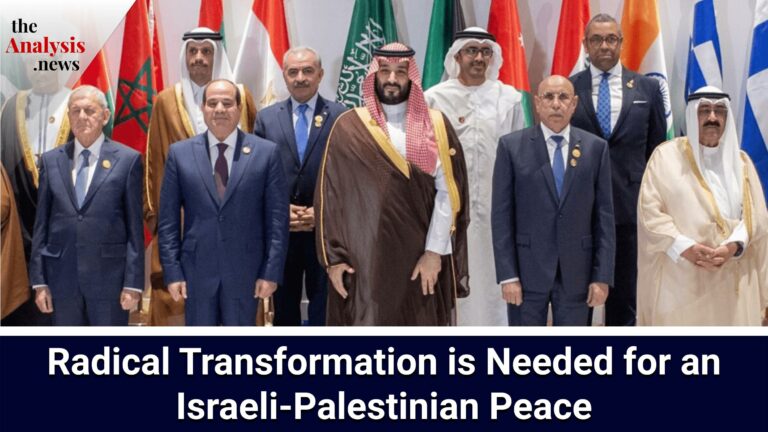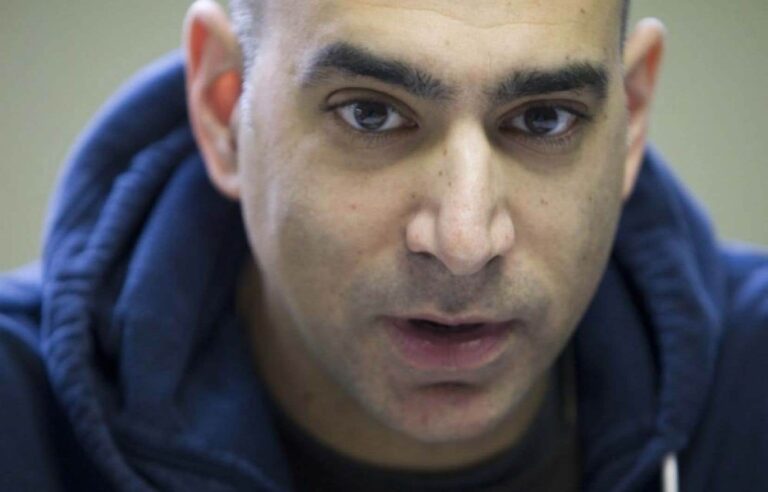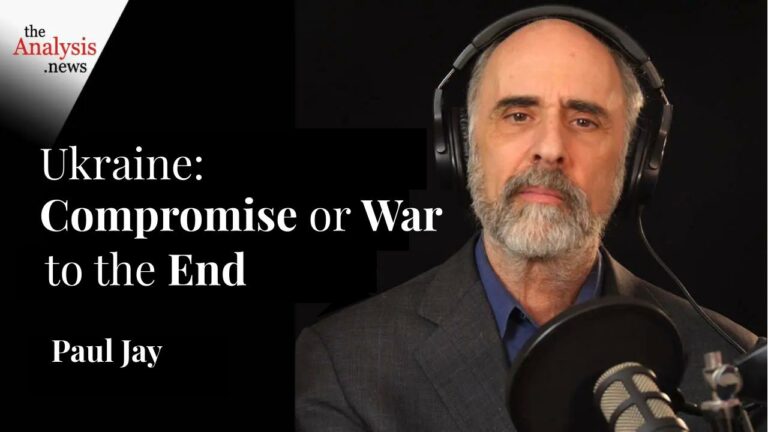Following the International Criminal Court (ICC) Prosecutor’s release of arrest warrants for Israeli Prime Minister Benjamin Netanyahu and Defence Minister Yoav Gallant, Germany, France, and the U.S. falsely characterized the warrants as inapplicable. International lawyer Triestino Mariniello, who represents Gaza Victims at the ICC, explains the legal obligation of state parties to the Rome Statute to enforce these arrest warrants. Mariniello exposes the U.S.’ false statements around the ICC’s supposed lack of jurisdiction over the State of Palestine and Israeli nationals.
U.S. Threatens ICC, Undermines International Legal Norms – Triestino Mariniello Pt. 2/2
Talia Baroncelli
Hi, I’m Talia Baroncelli, and you’re watching theAnalysis.news. I’m very excited about our guest today, international lawyer Triestino Mariniello, who’s been representing the Gaza victims at the ICC. Of course, he’ll be speaking about the recent arrest warrants against Israeli Prime Minister Benjamin Netanyahu and former Defense Minister Yoav Gallant.
If you enjoy this content and would like to support us, you can go to our website, theAnalysis.news, and hit the donate button at the top right corner of the screen. Make sure you’re on our mailing list; that way, we can send all of our new content straight to your inbox. You can like and subscribe to the show on our YouTube channel or on podcast streaming services such as Spotify or Apple. All right, let’s get into it with Professor Mariniello.
I’m very excited to be joined by Triestino Mariniello. He is a professor of law at Liverpool John Moores University and is one of the legal representatives of Gaza victims at the ICC. It’s really great to have you here today, Triestino. Thank you.
Triestino Mariniello
Thank you very much, Talia, for the invitation.
Talia Baroncelli
My pleasure. I wanted to speak to you about the ICC arrest warrants, which were recently released against Prime Minister Benjamin Netanyahu and former Defense Minister Yoav Gallant. Then, of course, also against Mohammed Al-Masri, also known as Deif, who, some presume, might be dead, but there’s been no confirmation of that yet. Why don’t we initially speak about the legal effects that this warrant has, and then we can get into how countries like Israel and Germany actually stalled the proceedings.
Triestino Mariniello
Well, starting from the legal effects, it has already been widely discussed these days. The most immediate legal effect is that all state parties to the International Criminal Court, currently 124 states, since the 1 of January 125, because Ukraine will also become officially a state party to the Rome Statute in January, have the legal obligation under the Rome Statute of the International Criminal Court to cooperate with the ICC.
Duty of cooperation includes the legal obligation to implement arrest warrants. What does this mean in practical words? It means that if Netanyahu and Gallant should visit one of these countries, domestic authorities of the state parties would have such obligation under the Rome Statute to arrest them and extradite them to the Hague.
Just to make it clear, I said it a few times: legal obligation, because we have heard a lot these days, particularly from some Western states, this idea of political discretion in relation to the arrest warrants. When we talk about state parties, in other words, for instance, all E.U. member states have ratified the Rome Statute, there is no such political discretion. They have a legal obligation. If they should visit one of these countries, they should arrest them. Otherwise, they will be in violation of the Rome Statute.
Talia Baroncelli
We also recently heard U.S. State Department spokesperson Matt Miller say that state parties to the Rome Statute can use their own discretion when it comes to whether they’ll apply these arrest warrants or not, which is obviously incorrect, as you’ve just laid out. But another thing that the U.S. constantly brings up when it comes to undermining the jurisdiction of the ICC is the issue of complementarity. They’re saying that democratic countries can start their own independent investigations and that the ICC can only intervene and start its own investigation as a last resort. So once that particular democratic country has finished up its own investigation. Can you explain why that is actually not the case here?
Triestino Mariniello
Well, we have a lot to talk about, in a way, another one about complementarity. Complementarity is the cornerstone of the Rome Statute of the International Criminal Court, which means that the court can intervene only in those cases in which states that have a primary jurisdiction are unwilling or unable to genuinely put in place investigations. The court intervenes only when there is a failure because of a lack of willingness or inability by the states.
In particular, the court intervenes, according to the jurisprudence of the International Criminal Court, if domestic authorities are not investigating the same person for the same conduct which is under the attention of the International Criminal Court.
Let’s start with this widely discussed rhetoric of the Israeli judicial system which will be willing and able to put in place genuine investigation. Actually, in general, that does not reflect the reality. The Israeli domestic justice system, as it has been widely documented by the UN Independent Commissions of Inquiry, is completely unwilling to investigate and prosecute Israeli military and political leaders for serious crimes committed against Palestinians. This is not just my speculation. This is, as I said, widely documented, for instance, by several international, even Israeli human rights organizations, and in particular by the UN Independent Commissions of Inquiry, which have widely reported how the Israeli justice system, when it comes to crimes against Palestinians, has the aim to protect, to shield Israeli officials from prosecutions and from justice. Their role is not really to provide any justice.
In this specific case of Netanyahu and the Gallant, we have to keep into account, first of all, this context. So, the context of a domestic justice system that is willing and most likely even unable to prosecute because of the lack of impartiality and independence. We are talking of the military justice system in particular, which would have competence over these kinds. But then the ICC also says that domestic jurisdiction has to deal with both the same person in the same conduct.
The ICC, in this case, analyzes where there are domestic proceedings ongoing against Netanyahu and Gallant for the same conduct that is being investigated. For instance, for starvation, for conducting intentional attacks against civilians, and there is no such thing in Israel. There has never been, even in the previous wars, where, for instance, intentional attacks against civilians were widely documented. I refer, for instance, to the 2014 military operation, Protective Edge, an Israeli leader, a political-military leader, has never been investigated or prosecuted for any crimes against Palestinian victims. That’s why complementarity does apply here because of a lack of willingness and, most likely, also of inability by the domestic authority to investigate and prosecute Netanyahu and Gallant.
Talia Baroncelli
All right, I wanted to read a statement from the ICC website so people can look this up. It’s from November 21, and it’s a statement of ICC prosecutor Karim Khan. He said, and I quote:
“With respect to Israeli Prime Minister Benjamin Netanyahu, and former Israeli Minister of Defence Yoav Gallant, the judges of the International Criminal Court have found that there are reasonable grounds to believe that each has committed the war crime of using starvation as a method of warfare and crimes against humanity of murder, persecution, and other inhumane acts, as a direct perpetrator, acting jointly with others. The Chamber also found reasonable grounds to believe that they are each responsible for the war crime of intentionally directing attacks against civilians as a superior.”
What you’re saying essentially is that Israel’s supposed independent judiciary is not actually investigating the crimes that Netanyahu and Gallant are being accused of here.
Triestino Mariniello
Well, they are not investigating at all. There is inaction. When there is inaction by domestic authorities, that’s enough to trigger the intervention of the International Criminal Court. We don’t need to assess inability or willingness, as I mentioned before. But even if domestic jurisdiction were investigating any cases falling under any of these crimes you were mentioning, that would not be enough. This investigation should concern Netanyahu and Gallant, not any other individual in Israel. Only when domestic authorities put in place a genuine domestic investigation, genuine means impartial and independent investigation, criminal proceedings, against Netanyahu and Gallant for the same conduct, will that be enough.
Israel will have the possibility before the International Criminal Court to challenge the admissibility. In other words, to say that they are generally putting in place investigations. But that’s never been the case so far for any of the most serious crimes committed against Palestinians. We are talking about Gaza, but the same applies to the West Bank.
Again, I was mentioning before the 2014 military operation in Gaza, Protective Edge. The Commission of War Crimes, at least by the Israeli Authority in that context, has been widely documented, also by the Independent Commissions of Inquiry by the UN. No individual has ever been prosecuted or at least investigated for the commission of these crimes. Only some soldiers have been convicted for the theft of a credit card in the Gaza Strip at the time. That already gives a clear idea of this alleged independent and impartial system that is widely used and abused by some states to prevent the courts from intervening.
Talia Baroncelli
Well, speaking about using and abusing the court system, we could also speak about the Germans and the Israelis. Germany has tried to stall the proceedings. Israel was also questioning the jurisdiction of the court. Can you speak a bit about what both of these countries were doing in trying to stall these proceedings and stall the investigation?
Triestino Mariniello
Well, it’s not just these countries. We need to make some steps back here, and we go back to when the prosecutor announced on the 20 of May 2024 the request for arrest warrants against three Hamas leaders and two Israeli political leaders, Netanyahu and Gallant. After a few weeks, the British authorities decided to intervene in the proceedings. To a certain extent, the de facto challenged the jurisdiction of the court. They say that the court does not have jurisdiction. They wish to say that for authorization for the court to say this, the court does not have jurisdiction over Israeli nationals because of the Oslo Accords, agreements between Palestine and Israel. In other words, they argue that because Palestine cannot exercise criminal jurisdiction over Israeli nationals, it cannot delegate this jurisdiction to the International Criminal Court.
Then what happened was that, surprisingly, the Chamber allowed the U.K. authorities to intervene in these proceedings, and that was quite surprising. I’m talking as a legal representative of victims here because there was a clear interference in the judicial proceedings by a state that, at least under the previous government, the Tory government, always opposed the investigation in the Israeli-Palestinian setting. But when the new government under [Keir] Starmer would do such a request, the court still allowed a long list of states, and this also includes Germany, as you were mentioning, but also the U.S., for instance, which are not a state party to the Rome Statute, as we know, to intervene and to submit their Amici Curiae, raising a lot of issues which were not only confined anymore to the jurisdiction under the Oslo Agreements but also on complementarity, also on the lack of evidence, which is really difficult to understand because the arrest warrants request are secret as well as the arrest warrants. How they could know the evidence submitted by the prosecutor is impossible. Even the victims who are part of the proceeding do not have access to the evidence submitted by the prosecutor.
This was an attempt by states, but also by a number of organizations and individual experts to prevent the court from intervening. Most of the states use political arguments. Going back to Germany, Germany surprisingly raised this argument that the court can not intervene when there is an armed conflict. If the court were going to accept German authorities’ allegation here, it means that most of the cases, situations before the ICC, should be shut down by tomorrow because most of them are, of course, in the context in which these crimes have been committed.
Then, again, surprisingly, Israel decided for the first time ever to intervene, which also is a de facto recognition of the court itself, of the legitimacy of the court. Israel had always decided to break out of the court, not to organize any role, but at the same time was using some other organization, their political allies, and also what we call proxy to intervene before the court. But this time, Israel intervened, and they challenged the jurisdiction of the court, first of all. But this was rejected exactly on the same day in which the court issued the arrest warrants. The Chamber rejected both the challenges submitted by the Israeli authorities. To be honest, all these submissions by states, at least states inviting the court not to intervene because there is a long list of states that also submitted allegations asking the court to intervene, saying that the court has jurisdiction. But those who opposed the investigation were raising political arguments or unfounded legal arguments. The suspect is that the tactic was to delay the issuance of the arrest warrants, the same tactic by the Israeli Authority, which, at a certain point, we can say to a certain extent, also challenged the impartiality and independence of one of the three judges, but this as well has been proven completely unfounded. That’s why the court could proceed with the issuance of warrants.
Talia Baroncelli
I wanted to ask you about the evidence on which this case is based. If I understood correctly, it begins on October 7, the day that Hamas launched its attacks, and then continues with Israel’s onslaught on the Palestinians and its genocidal war. But it ends on May 20, I believe. Why is that?
Triestino Mariniello
Because that’s the evidence. The court clearly states that these crimes have been committed at least until the 20 of May, because this is the date when the prosecutors submitted the arrest warrants request. Of course, the prosecutor is now in the ideal position to submit further evidence showing the ongoing commission of these crimes, but also of other crimes that are not included. We can talk about that as well. The investigation and the request for arrest warrants, as well as the issuance of arrest warrants, have been welcomed by Palestinian victims with huge enthusiasm. But this scope of the investigation, in our view, is still narrow because it does not include a long list of widely documented crimes against Palestinians, in particular in the Gaza Strip. We are discussing that, but we could go easily to the West Bank, including East Jerusalem.
For instance, in the Gaza Strip, the forced displacement of almost two million people in a context in which there is no safe place, amounts to a crime against humanity and also to a war crime under the International Criminal Court and has been widely documented in these 13 months. Why is it not included in the investigation? It’s quite surprising.
The same applies to the crimes against the Palestinian detainees in the Gaza Strip. It’s also been widely documented, the use of torture and the inhumane treatment against them. We would expect that the investigation would extend also to that. But the investigation would also extend to genocide. We can go back to talking about the ICJ. The conduct that the Chamber is discussing in its arrest warrants includes conduct that, if put in place, for instance, starvation can be a measure imposed to destroy the whole or, in part, Palestinians as a protected group if there is genocidal intent. We strongly believe, as discussed before the International Court of Justice, that there is this genocidal intent. We would expect that the prosecutor would extend his investigation to this crime.
Talia Baroncelli
I just want to back up a bit and speak about the court from 2009 and how victims of Israeli operations in the Gaza Strip, West Bank, and East Jerusalem have been trying to litigate their case at the ICC and to try to recognize the jurisdiction of the court. This started in 2009 after the Israeli operation, Cast Lead, but I don’t think it was until 2014, and then officially on paper in 2015, that the ICC actually recognized Palestine as a state and thus would have jurisdiction over issues in that particular area. Could you speak about how there’s been this delay on the part of the court initially saying that Palestine doesn’t fulfill the requirements of statehood?
Triestino Mariniello
I think this is a great point because it also gives us the possibility to place the current investigation and the current arrest warrant within a bigger context. As a lawyer, we cannot ignore, in this case, the context before the International Criminal Court. Really, it’s poorly reported how the situation in Palestine, as you correctly said, started in 2009, not on the 7 of October; also, to deconstruct the rhetoric that everything started on the 7 of October.
Why in 2009? In 2009, there had been another military operation in the Gaza Strip, which killed thousands of civilians, and that was Operation Cast Lead. What happened at the time was that Palestine decided to accept the jurisdiction of the International Criminal Court, which is a possibility that every non-state party has, accepting jurisdiction. So, even if you are not a state party, you enable the court to intervene by accepting this jurisdiction. It took the then prosecutor of the International Criminal Court, the Argentinian lawyer Luis Moreno-Ocampo, three years to issue a decision of no more than two pages, in which he actually said that he didn’t know, more or less. I’m exaggerating, but that’s the sense of whether Palestine was a state or not under the statute of the International Criminal Court.
In [inaudible 00:19:34], as the prosecutor discussed with the experts, civil society organization, with states about this issue, and he said, and surprisingly, very surprisingly, in contrast to what the Rome Statute said, he decided to delegate this issue to political bodies, which were the Assembly General of United Nations and the Assembly of State Parties to the ICC, which are political bodies. The question was, why not raise this issue before the competent judicial authority, which under the Rome Statute is the Pre-Trial Chamber? That was the decision in 2012, three years after the acceptance of the jurisdiction.
But then, in November 2012, the Assembly General took a position on this with a big majority by recognizing Palestine’s statehood, in that case, as a non-member state to the Assembly General as an observer state. Then again, everyone was expecting that any prosecutor was going to open the investigation because there was an answer to his question, but he completely ignored the decision of the Assembly General.
Then we go back to 2014. In July 2014, there was another military operation, the one we mentioned before, Protective Edge. Again, thousands of civilians were killed by the Israeli authorities in Gaza. After that, Palestine accepted again the jurisdiction of the International Criminal Court but took a further step this time. For the first time, it also ratified the statute of the International Criminal Court. The State of Palestine followed the correct procedure. In 2015, it was admitted by the Assembly of State Parties to the ICC as a state party and also included in the Bureau of the Assembly of State Parties, which is the body that exercises supervisory control over the activities of the Assembly of State Parties.
Talia Baroncelli
Can you explain who that is? Is it a Chamber or several judges who decide?
Triestino Mariniello
It’s the state. It’s the assembly of all the states that have ratified the Rome Statute. It was admitted in 2015 and was taking part in all the elections of the Assembly of State Parties. It was a donor state. I mean, put all rights and duties of the state parties. Then, at the end of 2019, the former prosecutor of the ICC, Fatou Bensouda, the second prosecutor, she announced the conclusion of her preliminary investigation when she said, “We have enough evidence concerning war crimes, by the Israeli Authority and Palestinian armed groups in 2014 in the Protective Edge military operation. It was in relation to the great march of return by the Palestinian authorities and in relation to the settlements as a war crime in the West Bank.”
The prosecutor decided, the former prosecutor, not to start an official investigation but to raise again the issue of Palestinian statehood before the Chamber, correctly this time before the Chamber. To be honest, there was no need because it had already been codified. She decided to raise this issue before the Chamber and ask the Chamber the following questions: Is Palestine a state under the Rome Statute? Second, what do we mean by Palestinian territory? In February 2021, the Chamber issued a decision. This decision said, “Palestine is a state under the Rome Statute, and Palestine territory means the West Bank, including East Jerusalem and the Gaza Strip.” So that’s where we can exercise our jurisdiction. In light of this decision, it was surprising that the issue on the jurisdiction was reopened a few months ago, as I mentioned before.
Talia Baroncelli
I’m also wondering because there have been many reports illustrating how the Israelis have actually spied on former prosecutors and spied on [Fatou] Bensouda. I’m just wondering if that perhaps intimidated former ICC prosecutor Bensouda to open the investigation any quicker. As you said, she then, as opposed to opening the investigation through the question of jurisdiction, went back to the actual judges of the ICC. John Bolton, for example, who was part of the Trump administration at the time, he was threatening to sanction the ICC. I believe that was in relation to the case of Afghanistan because Bensouda wanted to open up an investigation into U.S. conduct in Afghanistan. Could you speak a bit about the effects of that intimidation?
Triestino Mariniello
Well, on the last point, the Trump administration issued an executive order, which is an emergency legislation in the U.S., generally, that the U.S. uses against international drug traffickers or against human rights abusers, serious human rights abusers. For the first time, it was used against an official of an international organization, the prosecutor, and her staff, establishing economic sanctions and reducing her freedom of movement in the U.S. Of course, we don’t know the impact of these threats of sanctions on the work of the official prosecutor. We know that the former prosecutor was extremely brave to conclude the preliminary examination, an unprecedented decision at the time. We have seen what the former prosecutor, Ocampo, did, most likely as well under U.S. pressure, as it has been reported by some Palestinian human rights defenders who were attending a meeting with him.
It’s extremely important in order to shed light on the potential effects of such threats that there is an independent investigation, I think. There should be an independent investigation, in this case, asked, requested, or by the Assembly of the State Parties or by the presidency of the International Criminal Court because this will be beneficial to the court itself. Shedding light on what happened in those years after the Guardian and the magazine +972 widely reported these threats, which included the former Mossad director and threats against Bensouda and her husband. That will be crucial because it’s true that the preliminary investigation was close, but still the Palestine investigation situation was treated with exceptionalism compared to other situations. This is a referral to the Pre-Trial Chamber, which delayed the investigation.
For instance, something that happened during those years under Bensouda, when Bensouda was the former prosecutor at the ICC, the so-called Flotilla case was closed without an investigation. The Flotilla case, many will remember, was an attack by the IDF, by the Israeli Defense Forces, against the Freedom Flotilla that was trying to bring humanitarian aid to the Gaza Strip under blockade. This is before the 7 of October. Activists, the Turkish activists, were killed by the Israeli Defense Forces. Very surprisingly, the office of the prosecutor with Bensouda said, “We have enough evidence to conclude that the IDF, in this case, has committed war crimes, but these war crimes are not serious enough to warrant the intervention of the International Criminal Court.”
The problem is that the prosecutor used this concept of seriousness of gravity, which is very ambiguous. At the same time, the Office of the Prosecutor had opened investigations against other individuals in which there was a low number of victims. Comparing this with other cases, this became even more surprising. Many experts, including myself, came to the conclusion that this was a political, not a legal, decision.
Talia Baroncelli
That was part one of my discussion with Triestino Mariniello. In part two, we get into the ways in which the U.S. undermines international legal norms while saying that it still supports the so-called rules-based international order. See you next time.
Podcast: Play in new window | Download | Embed
Subscribe Apple Podcasts | Spotify | Android | iHeartRadio | Blubrry | TuneIn | Deezer | RSS
Never miss another story
Subscribe to theAnalysis.news – Newsletter
Triestino Mariniello has published a considerable number of peer-reviewed articles, books and book chapters in (international) criminal law and human rights law. He has been consulted as an expert in international criminal justice and human rights by several governmental and non-governmental organizations. He has been awarded the Alexander von Humboldt Fellowship for Experienced Researchers to conduct research in international criminal law at the Humboldt University of Berlin (2021-2023). Currently. he is Co-Investigator of the AHRC funded project on ‘Palestinian Bedouin at Risk of Forced Displacement: IHL Vulnerabilities, ICC Possibilities’. He is a qualified barrister in Italy and member of the legal team representing Gaza victims before the International Criminal Court. He has also served as a Visiting Professional and Associate Legal Officer at the Pre-Trial Division of the International Criminal Court.

